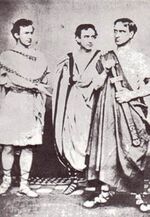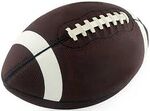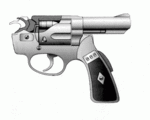Availability
“A weapon should be there when you need it”
Availability is a broad subject within the field of military science. It consists of work arising from the observation that a weapon is no good if it is not there when you need it. This body of work seeks to further national defense by ensuring that all necessary weapons are available when the need arises.
History[edit]
It has been millennia since Homo erectus came to the conclusion that weapons need to be available. Lacking the gift of language, he was slow to communicate this need. He was the first to observe that, when one's marital partner needs cold-cocking, the moment may pass if a suitable object, such as a hair brush, cannot be found. Duplication of weapons — locating a hair brush in every room the prospective victim frequents — is not a good solution and can even create additional arguments.
The analogues of Homo erectus in the military-industrial complex took this lesson to heart, and located weapons depôts in nearly every Congressional district, much as one or several water towers in every city make water available to the population without a cumbersome network of underground pipes.
More was going on here than the need to let legislators reassure their constituents that they are bringing home the bacon (the unnecessary spending) to the district, to enable the constituents to be the ones doing the unnecessary work. If the nation were attacked, and the weapons were found elsewhere, the attack might be successful. The only alternative to replicating weapons everywhere would be to build a wasteful network of unnecessary roadways, even though you could call them the Defense Highway System and hide the spending in the DoD budget, next to the Mars probes and the outreach to Muslims.
Modern improvements[edit]
During the Cold War, the Pentagon rejected the alternative of having one nuclear missile placed everywhere the President was scheduled to speak, even though it might be disguised as the podium or the TelePrompTer. Rather, they created the nuclear football: a marvelous gadget with which the President could call for the vaporization of troublesome foreigners using nuclear bombs that might be located elsewhere.
The strategy quickly showed hints of being ineffective. President Gerald Ford, in idle moments, used to grasp the nuclear football, feel the stitches with his fingertips, and several times threw it through an open window of the White House. Hermetically sealing the White House was merely a stop-gap measure. Later, Bill Clinton famously failed to memorize the access code for the nuclear football or to take it along with him on golfing trips or when otherwise distracted.
Availability in the future[edit]
The Department of Defense has a secret project that will enable America's nuclear arsenal to be controlled, as easily as home thermostats and brokerage accounts, from any "smart" Cell Phone. Thus a "tech-savvy" President like Barack Obama could activate a devastating atomic assault between taking selfies with serious foreign leaders.
Competing Presidential candidates, such as John McCain, with war wounds that make them unable to operate or even understand controls smaller than a light switch, would be disqualified for high office, and it would be unnecessary to accuse them of being sock puppets of the Koch Brothers or investigate their treatment of classmates fifty years ago, which would simplify governance.
Such universal availability of access to weapons will require a level of security much greater than that pursued by penny-ante rackets such as Goldman Sachs or Home Depot. The system must ensure that the person initiating nuclear war is actually the President and not some hacker from Russia impersonating him to phish for credit-card information. Adding a fingerprint reader to the nuclear football is one option, though no one wants to propose fingerprinting the President, as though he were some sort of awkward social misfit. Retina scans is another alternative that worked pretty well in Star Trek.
The solution the Department of Defense has settled on is to require the President to enter his Social Security number to verify his identity. The same solution has been embraced by every bank and financial institution, and by many fine chain-stores, and there is no sign that it can be misused, as no one knows the number except the individual to whom it is assigned.
Other availabilities[edit]
In parallel to availability (which argues that "a weapon is no good if it is not there when you need it"), the Army has recently prioritized adaptability, which says that "a weapon is no good, even if it is there when you need it, if you are in a desert and the weapon jams in sandstorms." Note that hair brushes are always adaptable.
The term availability is also widely used, and misused, in commerce. For example, an automobile manufacturer may state that four-on-the-floor and Synchro-mesh are "available" options. What this means is that they are "unavailable," unless you pay extra.



